A Pennsylvania non-compete agreement restrains an employee or entrepreneur from pursuing a line of business for a particular time or in a specific area. Pennsylvania, like other states, disfavors non-competes and accepts them only under certain circumstances. Its framework for when they are enforceable is also similar to other states, focusing on the reasonableness of the agreement and the interests it protects.
Table of Contents |
Are Non-Competes Enforceable in Pennsylvania?
Yes, so long as they are reasonably necessary to protect the employer’s legitimate business interests. (Sidco Paper Co. v. Aaron (1976)).
Reasonableness
To determine whether an agreement is reasonable and hence enforceable, courts balance:
- The employer’s protectable business interest;
- The interest of the employee in earning a living in the profession; and
- The interest of the public.
(Hess v. Gebhard & Co. Inc. (2002)).
Legitimate Business Interest
Interests that a non-compete agreement in Pennsylvania may protect include:
- Trade secrets or confidential information;
- Unique or extraordinary skills;
- Customer good will;
- Investments in specialized employee training; and
- In the healthcare field, patient referrals.
WellSpan Health v. Bayliss (2005).
Sale of Business vs. Employment Contract
Non-competes in contracts for a business’s sale are interpreted less strictly than non-competes included in an employment contract. (Hayes v. Altman (1970)).
Nondisclosure
Both non-compete agreements and nondisclosure agreements are considered “restrictive covenants” under Pennsylvania law. (Hess v. Gebhard & Co. Inc. (2002)).
Under Pennsylvania’s Uniform Trade Secrets Act, employers seeking to prevent the disclosure of trade secrets may obtain a court order to prevent an employee from working for a competitor. The employer must prove that beginning the new position will likely result in the disclosure of secrets. (Colorcon, Inc. v. Lewis (2011)).
Prohibited Professions
Attorneys may not enter non-compete agreements that limit their right to practice in the future when the agreements contained in:
- Contracts for employment, partnership, or similar arrangements, unless it concerns retirement benefits. Rule 5.6(a), Pennsylvania Rules of Professional Conduct.
- Case settlements. Rule 5.6(b), Pennsylvania Rules of Professional Conduct.
However, contracts for the sale of a law practice may contain limited, reasonable restrictions on future practice. Rule 5.6(a), Pennsylvania Rules of Professional Conduct.
Terminating an Employee
When an employer terminates an employee for failing to aid the interests of the business, a non-compete agreement is not enforceable against the employee. (Insulation Corp. of America v. Brobston (1995)).
Burden of Proof
The party seeking enforcement of an agreement initially has the burden of proving that it is necessary to protect a legitimate business interest. If this happens, the court balances the interests identified in the “reasonableness” section. If the court finds the agreement reasonable, the party opposing enforcement has the burden of showing that it is nonetheless unenforceable. (WellSpan Health v. Bayliss (2005)).
Continued Employment (consideration)
Continued employment is not adequate consideration to enforce a non-compete agreement. Instead, some new consideration is required. (George W. Kistler, Inc. v. O’Brien (1975)).
To be enforceable, non-compete agreements must include some beneficial change for the employee or a newly elevated status. (Socko v. Mid-Atlantic Systems of CPA, Inc. (2014)).
Maximum Term
There is no maximum term for a non-compete agreement, and the length of time an agreement can last depends on the size of the territory it covers. In the employment agreement context, agreements for one and two years have been upheld. (Jacobson & Co. v. International Environment Corp. (1967)).
In the context of the sale of a business, longer agreements are generally more acceptable. Courts have deemed several five-year agreements acceptable. (Sobers v. Shannon Optical Co., Inc. (1984)).
Blue Penciling (allowed)
Courts are permitted, but not required, to modify non-compete agreements and enforce them to the extent they are reasonable. (Sidco Paper Co. v. Aaron (1976)).
A court may likely decline to modify an agreement if the employer has displayed bad faith. In Reading Aviation Service, Inc. v. Bertolet (1973), the original agreement was considered so overbroad that it suggested an attempt to obtain a monopoly. The Pennsylvania Supreme Court declined to modify the agreement.
